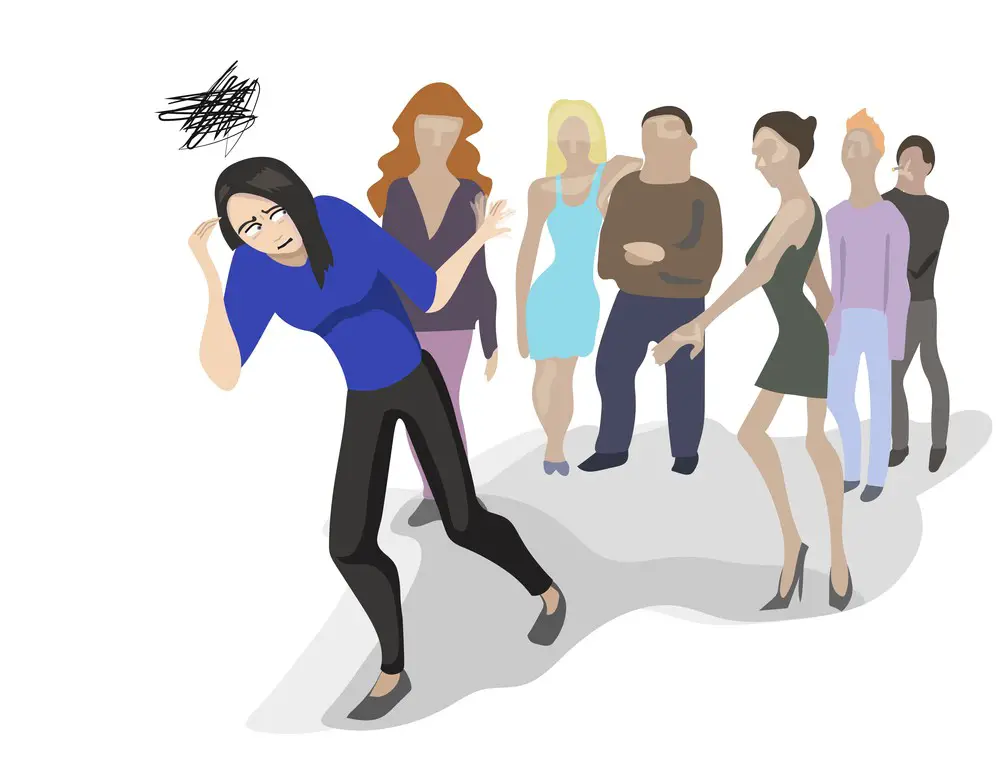As a BetterHelp affiliate, we receive compensation from BetterHelp if you purchase products or services through the links provided
Avoidant personality disorder can often prove challenging for mental health professionals to diagnose because of its similarities to other conditions. However, the results of an avoidant personality disorder test can help you learn more about your mental health so that you can take the necessary steps to improve it.
If you feel that extreme social inhibition is causing you work or relationship problems, you may have an avoidant personality disorder (AVPD). Some of the characteristics of AVPD include sensitivity to criticism and rejection and feelings of inadequacy, placing the condition into the same category as the other anxiety and fearful disorders known as Cluster C.
About 2.5% of the population suffer from AVPD, with slightly more women afflicted. The fear of disapproval or rejection felt by people with the disorder causes extreme discomfort, often likened to other anxiety disorders like social anxiety or paranoid personality.
Key Features of Avoidant Personality Disorder
Mental health professionals in the U.S. use a guide of indicative criteria for mental health disorders provided by the Diagnostic and Statistical Manual of Mental Disorders (DSM-5). According to this authoritative guide, someone with AVDP will have at least four of the key features of the condition, as seen below:
- Evades occupational activities, especially if these include significant interpersonal contact because the person fears criticism, disapproval, or rejection. The person may even reject a promotion offer, fearing they might receive criticism from their co-workers if they can’t cope with the new responsibilities.
- The person won’t get involved with others unless they are sure of being liked by their new friends or workmates.
- Maintains a restrained position within an intimate relationship, fearing being shamed or ridiculed by their partner.
- The person feels extreme preoccupation with being criticized or rejected socially. They also have feelings of inadequacy that inhibit them in new interpersonal situations.
- They see themselves as socially incompetent, personally unappealing, or inferior to others. Therefore, they carefully watch the expressions and movements of others in social situations because they fear ridicule or scorn, confirming their self-doubt.
- Usually reluctant to take personal risks or engage in new activities because they fear embarrassment.
A person with AVPD will have at least four or more of these characteristics, which began in early adulthood.

Benefits of Completing the Avoidance Personality Disorder Test
Unfortunately, many people have some form of mental illness without even knowing it because they think. these symptoms they feel are “normal.” Since they feel their paranoia is completely justified, they continue struggling with their feelings of inadequacy, social inhibition, and fear of negative evaluations.
Taking an avoidance personality disorder test can help you understand the state of your mental health, pointing you in the right direction to take the necessary measures to reduce the symptoms.
Avoidant Personality Disorder Test
The AVDP test below can help you better understand your mental health. It will take you just a few minutes to complete the eight questions. Your responses provide a clear assessment of the level of your avoidant personality, encouraging you to see a mental health professional if needed to improve your overall mental health.
- Do you avoid any work or school activities requiring working closely with others because you fear they will criticize or reject you and your thoughts?
- Yes
- No
- Sometimes
- Do you avoid making new friends unless you feel confident they will like and accept you?
- Yes
- No
- Sometimes
- Do you often find it challenging to agree to participate in group activities, requiring a great effort from your friends to get you to join?
- Yes
- No
- Sometimes
- Do you find it difficult to talk about yourself or your feelings in your relationships (romantic or otherwise), fearing negative judgment?
- Yes
- No
- Sometimes
- Do you feel extremely hurt and withdraw from a situation if someone slightly criticizes you?
- Yes
- No
- Sometimes
- Do you often feel that you are not good enough for others and that they will perceive what you say as wrong or stupid?
- Yes
- No
- Sometimes
- Are you conscious of being awkward, unattractive, or inferior when you meet new people?
- Yes
- No
- Sometimes
- Do you fear trying new things or taking risks, fearing you’ll embarrass yourself?
- Yes
- No
- Sometimes
If you have answered yes or sometimes to more than four questions in this avoidance personality disorder test, you may have AVPD. However, it’s best to have your primary care provider or a mental health professional diagnose you according to the guidelines listed in the DSM-5.
Avoidance personality Triggers
Several factors can trigger AVPD, including genetic, social, environmental, and psychological factors. For example, negative social experiences in childhood can increase the risk of developing avoidant personality disorder later. It can also occur in individuals who are very shy as children who do not outgrow this as they age.
AVPD often occurs in individuals with other conditions like social anxiety disorder, dependent personality disorder, borderline personality disorder, substance abuse disorder, agoraphobia, or depression.
The Seriousness of Avoidant Personality Disorder
Unfortunately, without treatment, individuals with avoidant personality disorder tend to cope by self-isolating or avoiding situations that cause them anxiety or dread. As a result, they tend to have few relationships and difficulties at school or work, especially avoiding situations requiring social contact.
These people often find it extremely difficult to maintain relationships, even though they may want to form them. Unfortunately, sufferers of the condition are also more prone to alcohol and substance abuse disorders.
AVPD Treatment
It’s essential to seek treatment for an avoidant personality disorder to reduce the symptoms and learn coping strategies for your anxieties.
Cognitive behavioral therapy (CBT) can help change your thinking patterns, or psychodynamic therapy can make you more aware of how your current issues relate to your past pain or experiences.
Schema therapy combines several therapeutic techniques, including CBT, to create an understanding and help develop healthy thought patterns.
Medications are not used to treat AVPD. However, doctors may prescribe them to help a patient alleviate the symptoms of related disorders like anxiety or depression or to reduce their sensitivity to feelings of rejection.
Tips for Coping With Avoidance Personality Disorder
If you or someone you love has AVPD, there are a few things that can help make living with the condition easier:
· Practice self-care and try to find activities that bring joy and relaxation.
· Don’t be too hard on yourself—accept your flaws and learn how to forgive yourself.
· Exercise regularly; physical activity has been proven to boost moods and reduce stress.
· Make connections—build relationships with people who will understand, accept, and support you.
· Prioritize personal safety—learn techniques to calm down during times of intense fear or anxiety.
· Seek professional help—talk to your primary care provider or a mental health specialist about the best treatment options.
Living with avoidant personality disorder can be difficult, but it’s not impossible. Individuals with AVPD can lead happy, fulfilling lives with the right coping skills and support system.
If you think you may have AVPD, it’s important to talk to a healthcare provider about your symptoms and discuss appropriate treatment options. With the right help, you can find ways to manage your condition and take back control of your life.
Resources:
· American Psychiatric Association. Diagnostic and Statistical Manual of Mental Disorders (DSM-5®). American Psychiatric Pub, 2013.
· Berger, M., et al. “What Is Avoidant Personality Disorder?” Mayo Clinic, The Mayo Clinic, 22 Jan. 2021, www.mayoclinic.org/diseases-conditions/avoidant-personality-disorder/symptoms-causes/syc-20355945.
· “Avoidant Personality Disorder: Treatment & Management.” Medscape, emedicine.medscape.com/article/294287-treatment.
· NHS (UK). “Avoidant Personality Disorder.” NHS, www.nhs.uk/conditions/avoidant-personality-disorder/.
· “Personality Disorders and Avoidant Personality Disorder Test.” BetterHelp, 11 Feb. 2021, www.betterhelp.com/advice/personality-disorders/personality-disorders-and-avoidant-personality-disorder-test/.
· Yates, Theresa. “How to Cope With Avoidant Personality Disorder.” Verywell Mind, 30 Dec. 2020, www.verywellmind.com/how-to-cope-with-avoidant-personality-disorder-3798204.
Final Take
Completing the avoidance personality disorder test is your first step to recognizing if you have the signs of the disorder. Then, armed with the results, you can approach the right person to help you take the first steps toward learning how to cope and improve your quality of life.



